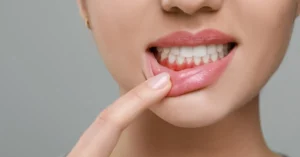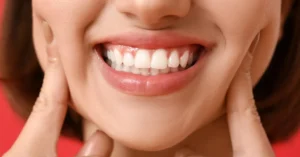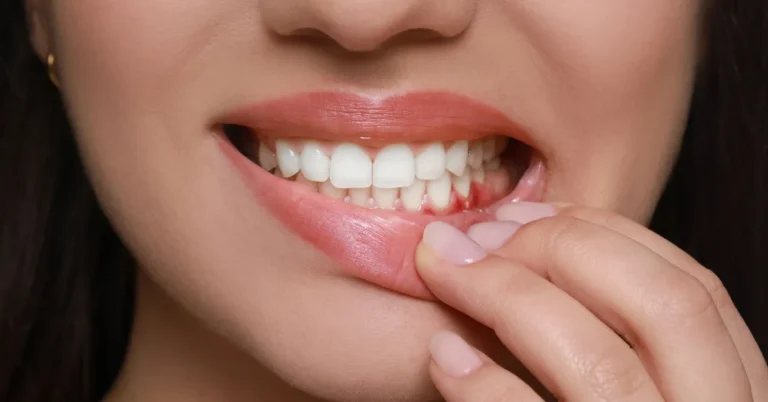Gum Disease Self-Care Guide
Table of Contents
Welcome to our comprehensive guide on periodontitis, where we delve into gum disease treatment, self-care practices, and symptoms. Backed by research, we’re here to equip you with the knowledge to combat periodontal issues effectively.
 Understanding Periodontitis
Understanding Periodontitis
Periodontitis is a severe form of gum disease characterized by inflammation and infection of the gums and surrounding tissues. It develops when plaque, a sticky film of bacteria, builds up on the teeth and hardens into tartar, leading to irritation and inflammation of the gums. Without proper treatment, periodontitis can progress, causing damage to the gums, bone, and supporting structures of the teeth.
Symptoms of Periodontitis
Identifying the signs of periodontitis is crucial for early intervention and effective treatment. Common symptoms include:
- Bleeding gums, especially during brushing or flossing.
- Swollen, tender gums.
- Persistent bad breath (halitosis).
- Receding gums or the appearance of longer teeth.
- Loose or shifting teeth.
- Formation of pus between the teeth and gums.
Recognizing these symptoms and seeking prompt dental care is essential to prevent further damage and complications.
Diagnosis and Treatment Options
Diagnosing periodontitis typically involves a thorough dental examination, including a review of medical history, assessment of symptoms, and periodontal probing to measure pocket depths. X-rays and other imaging techniques may also be used to evaluate bone loss and the extent of damage.
Once diagnosed, various treatment options are available, tailored to the severity and progression of the disease:
- Non-surgical treatments, such as root planing and scaling (deep cleaning for gums), aim to remove plaque and tartar from below the gumline, smooth out rough spots on the roots of the teeth, and promote healing of the gum tissue.
- For more advanced cases, surgical interventions, including periodontal surgery, gum grafting, and tissue regeneration, may be necessary to repair damage, reduce pocket depths, and restore periodontal health.
- Laser therapy is an innovative treatment that utilizes laser technology to remove diseased tissue, disinfect the gums, and promote healing with minimal discomfort and downtime.
Your dentist or periodontist will recommend the most appropriate treatment plan based on your individual needs and the extent of your periodontal disease.
 Home Remedies and Self-Care
Home Remedies and Self-Care
In addition to professional treatment, practicing good oral hygiene and adopting healthy habits at home play a vital role in managing gum disease and supporting periodontal health. Here are some self-care practices to incorporate into your daily routine:
- Brush your teeth twice a day with fluoride toothpaste and a soft-bristled toothbrush, paying special attention to the gumline and areas where plaque tends to accumulate.
- Floss daily to remove plaque and debris from between the teeth and along the gumline, where your toothbrush may not reach.
- Use an antiseptic mouthwash or rinse with saline solution to help reduce bacteria and control plaque buildup.
- Eat a balanced diet rich in fruits, vegetables, whole grains, and lean proteins, and limit sugary snacks and beverages that contribute to plaque formation and tooth decay.
- Avoid tobacco products, which can worsen gum inflammation, impair healing, and increase the risk of gum disease progression.
Incorporating these self-care practices into your daily routine can complement professional treatment and promote gum health at home.
Prevention Strategies
Preventing gum disease begins with proactive measures and regular dental care. Here are some prevention strategies to help maintain your oral health:
- Schedule regular dental check-ups and cleanings to detect and address early signs of gum disease.
- Follow your dentist’s recommendations for periodontal maintenance appointments, which may involve more frequent cleanings and evaluations to monitor your gum health and prevent disease recurrence.
- Maintain a balanced diet and avoid sugary snacks and beverages that contribute to plaque buildup and tooth decay.
- Practice good oral hygiene habits, including brushing your teeth twice daily, flossing daily, and using an antiseptic mouthwash or rinse.
- Quit smoking or using tobacco products, which can worsen gum inflammation, impair healing, and increase the risk of gum disease progression.
Conclusion
As you embark on your journey to combat gum disease, remember you’re not alone. With the support of dental professionals and the implementation of effective treatment and self-care strategies, you can overcome periodontitis and enjoy a healthy smile for years to come. By understanding the symptoms of periodontitis, seeking prompt diagnosis and treatment, and adopting preventive measures, you can take control of your oral health and preserve your smile for a lifetime.
References:
- American Academy of Periodontology. (n.d.). Gum Disease Symptoms. https://www.perio.org/consumer/gum-disease-symptoms.htm
- National Institute of Dental and Craniofacial Research. (n.d.). Periodontal (Gum) Disease: Causes, Symptoms, and Treatments. https://www.nidcr.nih.gov/health-info/gum-disease/more-info
- American Dental Association. (n.d.). MouthHealthy: Gum Disease. https://www.mouthhealthy.org/en/az-topics/g/gum-disease
FAQs Section
1. How to reverse gum disease at home?
At home, you can take several steps to help reverse gum disease:
- Maintain good oral hygiene by brushing your teeth twice daily with fluoride toothpaste and using dental floss daily to remove plaque and bacteria between your teeth.
- Use an antiseptic mouthwash or rinse with saline solution to help reduce bacteria and control plaque buildup.
- Eat a balanced diet rich in fruits, vegetables, whole grains, and lean proteins, and limit sugary snacks and beverages that contribute to plaque formation and tooth decay.
- Avoid tobacco products, which can worsen gum inflammation and impair healing.
2. How to stop gum disease from getting worse?
To prevent gum disease from progressing, it’s important to:
- Schedule regular dental check-ups and cleanings to detect and address early signs of gum disease.
- Follow your dentist’s recommendations for periodontal maintenance appointments, which may involve more frequent cleanings and evaluations to monitor your gum health and prevent disease recurrence.
- Maintain good oral hygiene habits, including brushing your teeth twice daily, flossing daily, and using an antiseptic mouthwash or rinse.
- Quit smoking or using tobacco products, as they can exacerbate gum inflammation and increase the risk of gum disease progression.
3. How to brush your teeth when you have gum disease?
When you have gum disease, brushing your teeth gently but thoroughly to remove plaque and bacteria without irritating your gums is important. Use a soft-bristled toothbrush and fluoride toothpaste, and brush gently and circularly, paying special attention to the gumline and areas where plaque accumulates. Avoid brushing too aggressively or using a toothbrush with hard bristles, as this can damage your gums and exacerbate gum inflammation.
4. How long does it take to reverse gum disease?
The time it takes to reverse gum disease can vary depending on the severity of the condition and how well you respond to treatment and self-care practices. With proper professional treatment and diligent home care, you may start to see improvement in your gum health within a few weeks to months. However, reversing gum disease completely may take longer, and ongoing maintenance and preventive measures are essential to prevent disease recurrence and maintain optimal oral health. It’s important to work closely with your dentist or periodontist to develop a personalized treatment plan and follow their recommendations for long-term success.
 Experience Excellence in Dental Care at Naples Dental Boutique
Experience Excellence in Dental Care at Naples Dental Boutique
Are you ready to prioritize your oral health and give your smile the attention it deserves? Take the first step towards optimal dental care by scheduling an appointment with the seasoned professional dental doctors at Naples Dental Boutique in Naples, FL. With our commitment to excellence and personalized care, you can trust our experienced team to provide comprehensive dental services tailored to your unique needs. Whether you require routine check-ups, advanced treatments, or cosmetic enhancements, we support you on your journey to a healthier, more radiant smile. Don’t wait any longer – contact us today to experience the difference firsthand and take control of your dental wellness!


